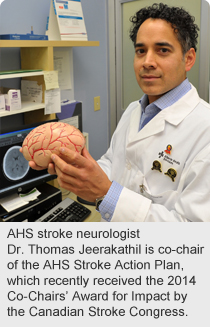
October 28, 2014
Story and photo by Colin Zak
Alberta Health Services (AHS) has gained national recognition for pioneering a new model in rural stroke care.
The Stroke Action Plan is a provincewide plan to ensure stroke patients in small urban and rural settings receive the same level of care delivered in larger centres. The project was awarded the 2014 Co-Chairs’ Award for Impact by the Canadian Stroke Congress.
“What we’re trying to do is replicate the experience of optimal stroke care for patients in rural and small urban areas,” says Dr. Thomas Jeerakathil, Associate Professor at the University of Alberta, stroke neurologist and co-chair of the project. “Improving access to and quality of stroke care translates into better outcomes and better quality of life for patients after a stroke.”
 The Stroke Action Plan – which is being led by the Cardiovascular Health & Stroke Strategic Clinical Network of AHS – includes the creation of stroke units (or stroke unit-equivalent care) within rural hospitals, as well as Early Supported Discharge teams for in-home rehabilitation following discharge.
The Stroke Action Plan – which is being led by the Cardiovascular Health & Stroke Strategic Clinical Network of AHS – includes the creation of stroke units (or stroke unit-equivalent care) within rural hospitals, as well as Early Supported Discharge teams for in-home rehabilitation following discharge.
Early Supported Discharge brings expert rehabilitation teams into the homes of stroke survivors. These teams include physical, occupational, and recreational therapists, speech language pathologists, nurses, social workers and therapy assistants.
“Allowing patients to return home sooner after a stroke helps free up inpatient beds and has been shown to improve patient outcomes,” Dr. Jeerakathil adds. “Early Supported Discharge programs in Calgary and Edmonton have cut the average length of stay for stroke patients substantially.”
Since Stroke Action Plan’s launch one year ago, Early Supported Discharge programs have been implemented at five small urban primary stroke centres and stroke unit-equivalent care has been established in 14 sites, reaching nearly 1,000 patients across Alberta.
“This project is a testament to the fact that we are able to deliver the same level of care to stroke patients, no matter where they are in Alberta,” says Shelley Valaire, Senior Provincial Director of the Cardiovascular Health & Stroke Strategic Clinical Network, AHS.
“We now know it is possible to improve care in smaller sites and standardize best practices across the province.”
The Canadian Stroke Congress is an annual forum for stroke care leaders to exchange ideas, collaborate, and learn about innovation in stroke prevention, treatment and recovery. The award was presented based on the abstract, Best Practices for Early Supported Discharge in Rural Stroke Care – The Dream and the Reality.
Strategic Clinical Networks bring together health leaders, clinicians, researchers, patients and families, devoted to finding new and innovative ways to provide better quality, better outcomes and better value for Alberta’s patients and families.
“In recent years, Alberta has become a national leader in stroke care, in large part due to projects like Stroke Action Plan,” says Dr. Verna Yiu, Vice President, Quality and Chief Medical Officer, AHS. “This award underscores the important work Strategic Clinical Networks are doing to transform care for all Albertans.”